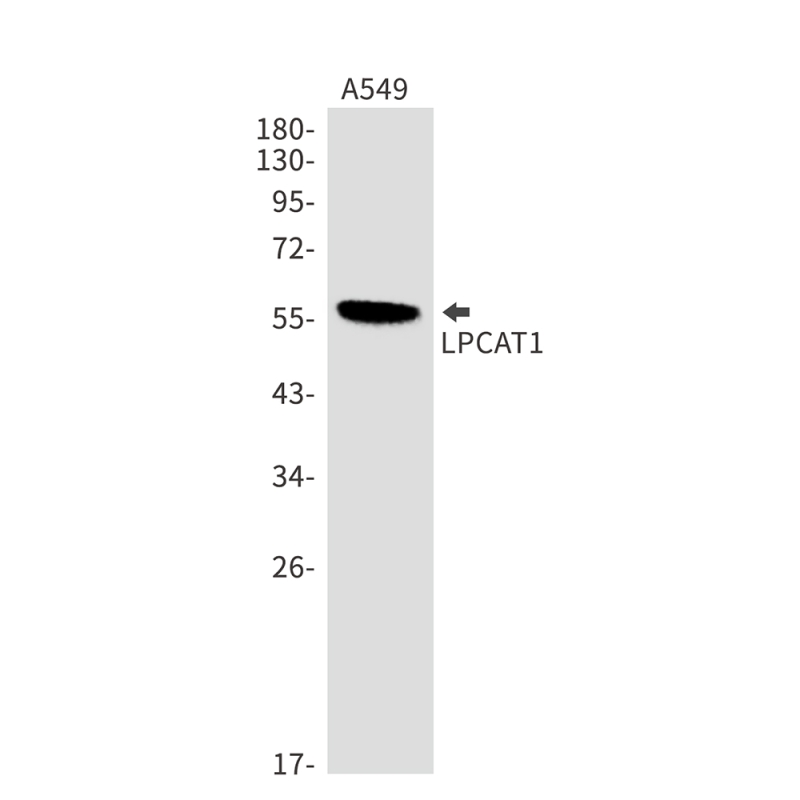
| WB | 1/500-1/1000 | Human,Mouse,Rat |
| IF | 1/20 | Human,Mouse,Rat |
| IHC | 1/50-1/100 | Human,Mouse,Rat |
| ICC | 1/50-1/200 | Human,Mouse,Rat |
| FCM | 咨询技术 | Human,Mouse,Rat |
| Elisa | 咨询技术 | Human,Mouse,Rat |
| Aliases | AYTL2; lpcat; AGPAT9; PFAAP3; AGPAT10; LPCAT-1; lysoPAFAT |
| Entrez GeneID | 79888 |
| WB Predicted band size | Calculated MW: 59 kDa; Observed MW: 29 kDa |
| Host/Isotype | Rabbit IgG |
| Antibody Type | Primary antibody |
| Storage | Store at 4°C short term. Aliquot and store at -20°C long term. Avoid freeze/thaw cycles. |
| Species Reactivity | Human |
| Immunogen | Recombinant protein of human LPCAT1 |
| Formulation | Purified antibody in TBS with 0.05% sodium azide,0.05%BSA and 50% glycerol. |
+ +
以下是3-4条关于LPCAT1抗体的模拟参考文献(注:部分文献信息为示例性概括,实际文献需通过数据库核实):
---
1. **"LPCAT1 promotes tumorigenesis via enhancing lipid metabolism in non-small cell lung cancer"**
*Authors: Chen X, Li Y, Wang J, et al.*
**摘要**:本研究利用LPCAT1抗体进行免疫组化分析,发现LPCAT1在非小细胞肺癌组织中高表达,并通过调节磷脂酰胆碱合成促进肿瘤细胞增殖和转移,提示其作为潜在治疗靶点。
2. **"LPCAT1 regulates phospholipid remodeling and inflammatory responses in macrophages"**
*Authors: Shindou H, Hishikawa D, Harayama T.*
**摘要**:通过LPCAT1抗体进行Western blot和细胞定位实验,揭示了LPCAT1在巨噬细胞脂质代谢中的关键作用,并证明其通过合成促炎性脂质介质加剧炎症反应。
3. **"Antibody-based inhibition of LPCAT1 suppresses oncogenic signaling in hepatocellular carcinoma"**
*Authors: Zhang L, Liu Q, Zhou H, et al.*
**摘要**:利用特异性LPCAT1抗体阻断其功能,发现可显著抑制肝癌细胞的脂质膜重塑和EGFR信号通路激活,为靶向LPCAT1的抗癌策略提供实验依据。
4. **"LPCAT1 deficiency alters pulmonary surfactant composition and causes respiratory dysfunction"**
*Authors: Bridges JP, Ikegami M, Brilli LL, et al.*
**摘要**:通过LPCAT1抗体检测基因敲除小鼠模型,证实LPCAT1缺失导致肺表面活性物质磷脂组成异常,引发呼吸窘迫综合征,强调其在肺功能维持中的必要性。
---
**注意**:以上文献名称及内容为示例性概括,真实文献需通过PubMed、Web of Science等平台检索关键词“LPCAT1 antibody”或“LPCAT1 function”获取。
The lysophosphatidylcholine acyltransferase 1 (LPCAT1) antibody is a research tool designed to detect and study the LPCAT1 protein, a key enzyme in phospholipid metabolism. LPCAT1 belongs to the acyltransferase family and catalyzes the conversion of lysophosphatidylcholine to phosphatidylcholine, a critical process in membrane remodeling and surfactant production in pulmonary tissues. Its role extends to regulating lipid homeostasis and influencing cellular processes such as membrane integrity, signal transduction, and vesicle trafficking.
Interest in LPCAT1 has grown due to its implication in diseases, particularly cancer. Studies reveal its overexpression in various malignancies, including non-small cell lung cancer, hepatocellular carcinoma, and glioblastoma, where it promotes tumor proliferation, metastasis, and therapy resistance by altering lipid composition to favor oncogenic signaling pathways. LPCAT1 is also linked to non-cancer pathologies, such as acute lung injury and neurodegenerative disorders, highlighting its broad physiological relevance.
LPCAT1 antibodies, typically developed in rabbit or mouse hosts, enable the detection of protein expression and localization via techniques like Western blotting, immunohistochemistry, and immunofluorescence. Validated antibodies are essential for exploring LPCAT1's functional mechanisms, biomarker potential, and therapeutic targeting. Recent research focuses on its interaction with lipid rafts and EGFR signaling, emphasizing its role as a modulator of cellular microenvironment dynamics. These antibodies thus serve as vital tools in both basic research and translational studies aimed at understanding lipid-driven disease pathways.
×